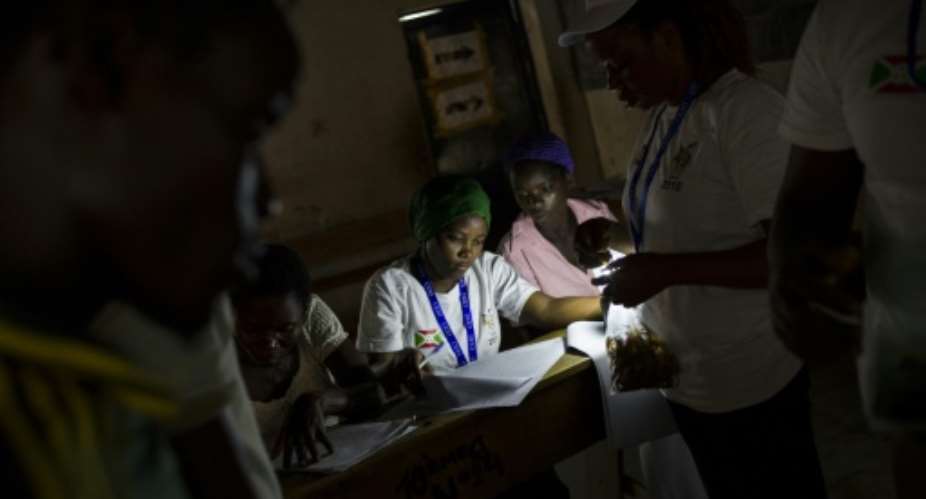United Nations (United States) (AFP) - Elections in Burundi that were wracked by violence and boycotted by the opposition were not free or credible, United Nations observers said Thursday, a day after clashes left six dead in the capital.
Parliamentary and local elections were held on Monday despite an appeal by UN Secretary-General Ban Ki-moon to postpone the polls after months of turmoil.
The UN electoral observer mission said in a report that the elections took place "in a tense political crisis, and a climate of widespread fear and intimidation in parts of the country."
"Episodes of violence and explosions preceded, and in some cases accompanied election day activities, mostly in Bujumbura," said the nine-page report.
The mission concluded "that the environment was not conducive for free, credible and inclusive elections."
The results of the parliamentary polls have yet to be released but Belgium has said it will not recognize the outcome.
Clashes in the capital Bujumbura on Wednesday left six dead in the opposition stronghold of Citiboke district, which has seen weeks of protests against President Pierre Nkurunziza's rule.
Police said a grenade was thrown at a police patrol, injuring two officers and triggering gunbattles in which one police officer died.
Five others, described as members of an armed group, were killed, but witnesses said they were brutally executed by police.
An AFP reporter at the scene saw the six bodies, three of whom had bullet wounds to the head.
The elections on Monday set the stage for the presidential vote on July 15.
- Opposition, media clampdown -
The UN observers said ruling party candidates were able to campaign throughout the country but that opposition politicians were "much less visible."
The report described widespread media restrictions, with journalists targeted for assaults, detentions, attacks and expulsions.
International alarm has been growing over the crisis in Burundi, triggered by Nkurunziza's bid to run for a third consecutive five-year term.
Opponents say that is unconstitutional and violates a peace accord that ended 13 years of civil war in 2006.
At least 70 people have been killed and more than 140,000 have fled Burundi seeking refuge in neighboring countries.
The UN Security Council met to discuss the crisis and the way forward after hearing a report from envoy Abdoulaye Bathily.
Bathily cast doubt on the government's willingness to hold talks with the opposition to try to resolve the crisis, according to diplomats who were present at the closed-door meeting.
During a council meeting last week, Burundi's Ambassador Albert Shingiro described the opposition as "spoiled brats" who were making too many demands and insisted that the elections would go forward.
The council has been struggling for months to agree on a common stance on the Burundi crisis, with Russia insisting it is an internal matter and African countries reluctant to take a strong position.
New Zealand's Ambassador Gerard Jacobus van Bohemen, who holds this month's presidency of the Security Council, said the 15 members "expressed concern that the minimum conditions for free, fair, transparent and credible elections were not met."
East African leaders are due to address the Burundi crisis at their summit meeting on Monday.





 Dumsor must stop vigil part 2: We’ll choose how we demonstrate and who to partne...
Dumsor must stop vigil part 2: We’ll choose how we demonstrate and who to partne...
 2024 elections: NDC stands on the side of morality, truth; NPP isn't an option —...
2024 elections: NDC stands on the side of morality, truth; NPP isn't an option —...
 Akufo-Addo has moved Ghana from 'Beyond Aid' to ‘Beyond Borrowing’ — Haruna Idri...
Akufo-Addo has moved Ghana from 'Beyond Aid' to ‘Beyond Borrowing’ — Haruna Idri...
 Train crash: NDC is full of evil mindset; driver who 'deliberately' parked the c...
Train crash: NDC is full of evil mindset; driver who 'deliberately' parked the c...
 Dumsor: Energy Minister must be fired; it’s becoming unbearable — IES
Dumsor: Energy Minister must be fired; it’s becoming unbearable — IES
 #DUMSORMUSTSTOP: IMANI responds to Yvonne Nelson's call for a joint vigil
#DUMSORMUSTSTOP: IMANI responds to Yvonne Nelson's call for a joint vigil
 'Obiara b3didi' — Manhyia South NPP Chairman fights for resourcing of NPP grassr...
'Obiara b3didi' — Manhyia South NPP Chairman fights for resourcing of NPP grassr...
 Dumsor: This thing is becoming unbecoming, collapsing our business — Nana Ofori ...
Dumsor: This thing is becoming unbecoming, collapsing our business — Nana Ofori ...
 Dumsor: It'll be no more by the end of April — Gideon Boako assure Ghanaians
Dumsor: It'll be no more by the end of April — Gideon Boako assure Ghanaians
 "I can now see clearly with my two eyes, thanks to the generosity of Afenyo-Mark...
"I can now see clearly with my two eyes, thanks to the generosity of Afenyo-Mark...
